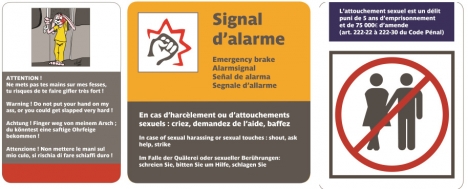France unveils plan to tackle sexual harassment

The French public are to be reminded through an advertising campaign that sexual harassment is illegal, as the government tries to crack down on the scourge of sex pests on public transport.
Ever since a poll was published earlier this year claiming 100 per cent of the women surveyed had been victims of sexual harassment on public transport, the French government has been under pressure to deal with the issue.
Womens' rights groups have long been pleading with the government to act against a problem that France's high council on equality said was a "poorly understood phenomenon [that is] largely downplayed or trivialised".
On Wednesday the government came up with their answer when Ministers unveiled a series of measures aimed at cracking down on harassment.
They included exploring the possibility of allowing passengers on night buses to get on and off where they want and a campaign to remind the general public that groping, verbal harassment and other forms of intimidation are punishable by law.
The measures include:
-
A campaign this autumn that will use advertising space on the transport network to remind travellers that harassment and gender-based violence are punishable by law (up to five years in prison), and to encourage witnesses to show solidarity with victims in harassment situations.
-
A trial, to take place in Nantes that will allow passengers on night buses to stop the bus on demand rather than only being able to board and alight at bus stops.
-
Developing new digital tools to report harassment including text alerts.The emergency number 3117 will be introduced before the end of this year, which can be used to report cases of harassment, and to trigger the intervention of security staff. An app will be created that will allow for reported incidents to be geo-localized.
-
Training of transport staff and promoting gender equality within transport companies.Transport staff will attend training modules designed to improve empathy with victims.
-
Transport chiefs will work with advertising agencies to prevent adverts using sexist imagery being displayed on the transport network.
tranquille la pub sexiste @Galeries_Laf ? #agressionvisuelle #sexismeTranquillou #sexismeOrdinaire pic.twitter.com/5At5UwykS9
— David Sultan (@David_Slt) July 1, 2015
-
Women will take part in visits to train and Metro stations to identify aspects of the environment which could be improved in order to prevent sexual harassment such as better lighting, ensuring there is a human presence at the station and installing CCTV where needed.
The measures were put forward by the Interior Minister Bernard Cazeneuve, secretary of state for women's rights Pascale Boistard and transport secretary Alain Vidalies and come months after France's High Council on equality (HCEfh) raised the alarm about the issue.
In April the body penned a report urging the government to crack down on sexual harrassment on public transport, after a survey it carried out returned shocking responses from Parisian women.
The study found that a full 100 per cent of the 600 women in Seine-Saint-Denis and Essonne, two areas in the outer suburbs of Paris, said they had experienced at least some form of gender-based sexual harassment while riding the train.
"We all know that at least once in our lives, and often much more, we will have to deal with either unpleasant words about the way we are dressed, sexual assault, hands on buttocks, or hands on the breasts," Ernestine Ronai fromthe HCEfh told "France Info".
"Touching somebody's buttocks is sexual assault and punishable by five years in prison and a €75,000 fine," she said.
Margaux Collet, spokeswoman for Osez Le Féminsme (Dare Feminism), said it was high time that France implemented the regulations.
"What we need now is a real response from the government. The public are demanding it," she told The Local.
The group noted that the report was the first to recognise the "magnitude of the phenomenon".
"The problem is that harassment on public transport has basically been trivialised. The figures are shocking. It exists everywhere but its something young foreign women notice when they come to Paris," Collet added.
Her group has led a "Take Back the Metro" campaign for several months to try to raise awareness of the daily harassment women have to endure on the Paris transport network.

Comments
See Also
Ever since a poll was published earlier this year claiming 100 per cent of the women surveyed had been victims of sexual harassment on public transport, the French government has been under pressure to deal with the issue.
Womens' rights groups have long been pleading with the government to act against a problem that France's high council on equality said was a "poorly understood phenomenon [that is] largely downplayed or trivialised".
On Wednesday the government came up with their answer when Ministers unveiled a series of measures aimed at cracking down on harassment.
They included exploring the possibility of allowing passengers on night buses to get on and off where they want and a campaign to remind the general public that groping, verbal harassment and other forms of intimidation are punishable by law.
The measures include:
- A campaign this autumn that will use advertising space on the transport network to remind travellers that harassment and gender-based violence are punishable by law (up to five years in prison), and to encourage witnesses to show solidarity with victims in harassment situations.
- A trial, to take place in Nantes that will allow passengers on night buses to stop the bus on demand rather than only being able to board and alight at bus stops.
- Developing new digital tools to report harassment including text alerts.The emergency number 3117 will be introduced before the end of this year, which can be used to report cases of harassment, and to trigger the intervention of security staff. An app will be created that will allow for reported incidents to be geo-localized.
- Training of transport staff and promoting gender equality within transport companies.Transport staff will attend training modules designed to improve empathy with victims.
- Transport chiefs will work with advertising agencies to prevent adverts using sexist imagery being displayed on the transport network.
tranquille la pub sexiste @Galeries_Laf ? #agressionvisuelle #sexismeTranquillou #sexismeOrdinaire pic.twitter.com/5At5UwykS9
— David Sultan (@David_Slt) July 1, 2015
- Women will take part in visits to train and Metro stations to identify aspects of the environment which could be improved in order to prevent sexual harassment such as better lighting, ensuring there is a human presence at the station and installing CCTV where needed.
The measures were put forward by the Interior Minister Bernard Cazeneuve, secretary of state for women's rights Pascale Boistard and transport secretary Alain Vidalies and come months after France's High Council on equality (HCEfh) raised the alarm about the issue.
In April the body penned a report urging the government to crack down on sexual harrassment on public transport, after a survey it carried out returned shocking responses from Parisian women.

Join the conversation in our comments section below. Share your own views and experience and if you have a question or suggestion for our journalists then email us at [email protected].
Please keep comments civil, constructive and on topic – and make sure to read our terms of use before getting involved.
Please log in here to leave a comment.